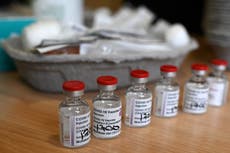What you need to know about Covid vaccine mixing and matching
The treatment, known as a heterologous prime-boost, can only be administered with licensed jabs
The government has announced that it is launching a new study in the UK, a world first, which will explore the possibility of ‘mixing and matching’ different coronavirus vaccines.
Known as a heterologous prime-boost, the treatment can only be administered with licensed jabs and involves using one dose each of two different vaccines.
What are the facts?
The trial, dubbed Com-Cov, will initially look at combining doses of the Oxford/AstraZeneca and Pfizer/BioNTech vaccines, but researchers said more candidates will be added to the list.
Those aged 50 and over are being called on to take part in the research, with 820 patients expected to be involved.
They will be recruited over the course of February through the NHS Covid-19 Vaccine Research Registry, with initial results expected to become available during the summer.
The study will initially include test eight different combinations, which include dosing regimens that are either 12 weeks apart or 28 days apart.
The study is being run by the National Immunisation Schedule Evaluation Consortium (NISEC) across eight different sites across England – in London, Oxford, Southampton, Birmingham, Bristol, Nottingham and Liverpool.
It has been classified as an Urgent Public Health study by the National Institute for Health Research and has been given £7 million in funding from the government through the Vaccines Taskforce.
Is it safe?
‘Mixing and matching’ vaccines isn’t as frivolous as it sounds.
Sir Patrick Vallance, the government’s chief scientific adviser, said the treatment was a “pretty standard way of boosting the immune system”.
"What it means is that you give one vaccine to get the immune system triggered up and another one to then boost it further with a different vaccine — that's an established way of getting the immune system geed up,” he said.
Public Health England’s Green Book on vaccinations already says that, in exceptional circumstances, people can be given a different second dose to their first if it’s not available due to supply issues.
Nadhim Zahawi, the vaccines minister, said mixing jabs would not be recommended outside the study “until researchers and the regulator are absolutely confident the approach is safe and effective”.
Why is the UK exploring this?
Scientists want to know what levels of protection are generated from mixing the approved Covid vaccines.
It’s ultimately hoped that a heterologous prime-boost will help to enhance the body’s immune response to Sars-CoV-2, the virus responsible for Covid-19.
The supply of vaccines is no doubt set to be patchy throughout 2021, meaning there may be periods where certain manufacturers are unable to deliver enough doses due to production issues.
In those circumstances, the ‘mix and match’ approach would bring a degree of adaptability to the UK’s vaccination programme.
There’s also hope that a heterologous prime-boost may provide greater protection against the different coronavirus variants that have emerged in the UK, South Africa and Brazil.
Matthew Snape, a professor of vaccinology at the University of Oxford and chief investigator in the trial, said: “If we do show that these vaccines can be used interchangeably in the same schedule, this will greatly increase the flexibility of vaccine delivery and could provide clues as to how to increase the breadth of protection against new virus strains.”
Professor Jonathan Van-Tam, who is overseeing the study, said: "Given the inevitable challenges of immunising large numbers of the population against Covid-19 and potential global supply constraints, there are definite advantages to having data that could support a more flexible immunisation programme, if needed and if approved by the medicines regulator.
“It is also even possible that by combining vaccines the immune response could be enhanced, giving even higher antibody levels that last longer. Unless this is evaluated in a clinical trial, we just won’t know. This study will give us greater insight into how we can use vaccines to stay on top of this nasty disease.”
The vaccine testing combinations
- Two doses of the Oxford/AstraZeneca vaccine at 28 days apart
- Two doses of the Oxford/AstraZeneca vaccine at 12 weeks apart – as a control group
- Two doses of the Pfizer/BioNTech vaccine at 28 days apart
- Two doses of the Pfizer/BioNTech vaccine at 12 weeks apart – as a control group
- The Oxford/AstraZeneca vaccine for the first dose, followed by the Pfizer/BioNTech vaccine for the second, at 28 days apart
- The Oxford/AstraZeneca vaccine for the first dose, followed by the Pfizer/BioNTech vaccine for the second, at 12 weeks apart
- The Pfizer/BioNTech vaccine for the first dose, followed by the Oxford/AstraZeneca vaccine for the second, at 28 days apart
- The Pfizer/BioNTech vaccine for the first dose, followed by the Oxford/AstraZeneca vaccine for the second, at 12 weeks apart
Join our commenting forum
Join thought-provoking conversations, follow other Independent readers and see their replies
Comments


Bookmark popover
Removed from bookmarks